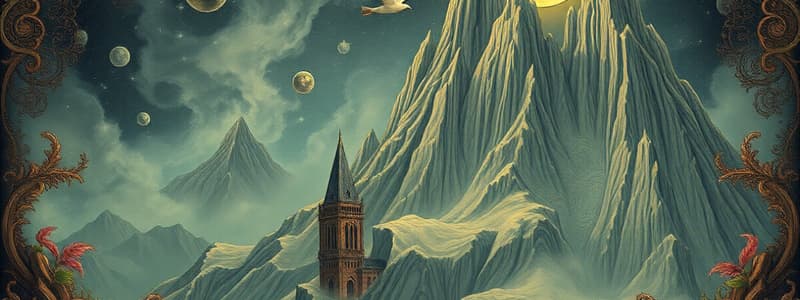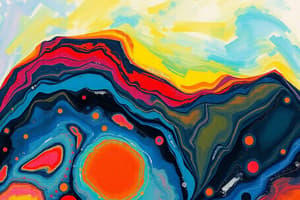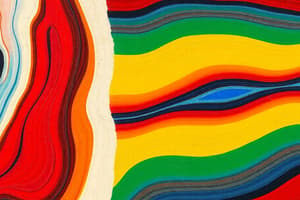Podcast
Questions and Answers
What does the term lithosphere refer to?
What does the term lithosphere refer to?
- The inner core of the Earth
- A rigid layer formed by the crust and upper mantle (correct)
- A soft, weak zone within the Earth
- A layer of liquid rock beneath the crust
How thick is the asthenosphere, approximately?
How thick is the asthenosphere, approximately?
- 5 to 10 km
- 20 to 50 km
- 80 to 150 km (correct)
- 200 to 300 km
Where are most earthquakes concentrated?
Where are most earthquakes concentrated?
- In areas with wide continental shelves
- In the midst of ocean abyssal plains
- Uniformly across all continents
- In discrete belts and along volcanic islands (correct)
Which geographical feature is most likely to experience numerous earthquakes?
Which geographical feature is most likely to experience numerous earthquakes?
What term describes the processes that deform the crust and mantle?
What term describes the processes that deform the crust and mantle?
Which of the following regions has a high frequency of earthquakes?
Which of the following regions has a high frequency of earthquakes?
Which event was a result of large earthquakes near ocean trenches?
Which event was a result of large earthquakes near ocean trenches?
What characterizes the asthenosphere?
What characterizes the asthenosphere?
What forms at the site of an ocean-ocean convergent boundary?
What forms at the site of an ocean-ocean convergent boundary?
What is the process called when one plate slides beneath another?
What is the process called when one plate slides beneath another?
What geological feature is created by the convergence of an oceanic plate and a continental plate?
What geological feature is created by the convergence of an oceanic plate and a continental plate?
How does the crust respond when two continental plates converge?
How does the crust respond when two continental plates converge?
Where are the volcanoes of the Pacific Ring of Fire located?
Where are the volcanoes of the Pacific Ring of Fire located?
What type of motion occurs at transform boundaries?
What type of motion occurs at transform boundaries?
What is a characteristic of transform faults associated with mid-ocean ridges?
What is a characteristic of transform faults associated with mid-ocean ridges?
Which of the following correctly describes a fracture zone?
Which of the following correctly describes a fracture zone?
What effect can the upward movement of magma beneath a volcano have on surrounding rocks?
What effect can the upward movement of magma beneath a volcano have on surrounding rocks?
What is a volcanic tremor?
What is a volcanic tremor?
What happens to rocks before faulting occurs?
What happens to rocks before faulting occurs?
Which phenomenon can cause ground shaking due to volcanic activity?
Which phenomenon can cause ground shaking due to volcanic activity?
How do mine blasts and nuclear explosions generate seismic waves?
How do mine blasts and nuclear explosions generate seismic waves?
What initiates the slippage along a fault?
What initiates the slippage along a fault?
What can be a signal of an impending volcanic eruption?
What can be a signal of an impending volcanic eruption?
What occurs to the strained rocks after faulting?
What occurs to the strained rocks after faulting?
What occurred at 4:19 AM on August 02, 1968, in Casiguran, Aurora?
What occurred at 4:19 AM on August 02, 1968, in Casiguran, Aurora?
Which oceanic plate is subducting beneath the Eurasian plate?
Which oceanic plate is subducting beneath the Eurasian plate?
What happens when a seismic wave passes from a slower material to a faster one?
What happens when a seismic wave passes from a slower material to a faster one?
What is indicated by the yellow dots near the fault line?
What is indicated by the yellow dots near the fault line?
What was one consequence of the 1968 Casiguran earthquake?
What was one consequence of the 1968 Casiguran earthquake?
What action did the Philippine government take in response to geologic hazards?
What action did the Philippine government take in response to geologic hazards?
What type of rays are affected when seismic waves change from fast to slow materials?
What type of rays are affected when seismic waves change from fast to slow materials?
What is the intensity level of the earthquake that struck Casiguran according to the Rossi-Forel Intensity Scale?
What is the intensity level of the earthquake that struck Casiguran according to the Rossi-Forel Intensity Scale?
What is indicated by the yellow dots on the map described?
What is indicated by the yellow dots on the map described?
Which earthquake caused moderate damage but only injured two people?
Which earthquake caused moderate damage but only injured two people?
What was a significant factor contributing to the destruction during the 2011 Christchurch quake?
What was a significant factor contributing to the destruction during the 2011 Christchurch quake?
What type of fault is shown by the red lines on the map?
What type of fault is shown by the red lines on the map?
How high can tsunami waves reach as described from the 2004 earthquake?
How high can tsunami waves reach as described from the 2004 earthquake?
What resulted from the liquefaction of soil during the 2011 Christchurch earthquake?
What resulted from the liquefaction of soil during the 2011 Christchurch earthquake?
What was the magnitude of the undersea earthquake off the coast of Sumatra on December 26, 2004?
What was the magnitude of the undersea earthquake off the coast of Sumatra on December 26, 2004?
Which characteristic of the 2010 Canterbury earthquake is mentioned?
Which characteristic of the 2010 Canterbury earthquake is mentioned?
Flashcards are hidden until you start studying
Study Notes
Earth's Lithosphere and Asthenosphere
- The lithosphere is a rigid layer formed from the crust and upper mantle, derived from the Greek word "lithos" meaning "stone."
- The asthenosphere is a soft, weak layer beneath the lithosphere, approximately 80 to 150 km thick. Its base can be found up to 250 km deep.
Earthquake Distribution
- Earthquakes are not uniformly distributed; they mainly occur in discrete belts.
- Notable earthquake zones include the western coasts of North and South America and mid-ocean ridges.
- Regions of high seismic activity include the Middle East, China, and Tibet, while abyssal plains often have few earthquakes.
- Large earthquakes can create tsunamis, as evidenced by disasters in the Indian Ocean (2004) and Japan (2011).
Tectonic Activity and Plate Convergence
- Tectonic activity, which includes earthquakes and volcanic eruptions, occurs primarily along plate boundaries with active deformation.
- Oceanic-oceanic convergence forms ocean trenches and subduction zones known for large earthquakes.
- When an oceanic plate converges with a continental plate, it results in crust compression and uplift.
Pacific Ring of Fire
- The Pacific Ring of Fire comprises volcanoes surrounding the Pacific Ocean, linked to subduction activities on both sides.
- It extends from the southwestern Pacific, through the Philippines, Japan, Alaska, and down western coasts of the Americas.
Continental Collisions and Transform Boundaries
- Continental collision occurs at continent-continent convergent boundaries, generating major mountain ranges.
- Transform boundaries allow plates to slip horizontally past each other, creating transform faults typically associated with mid-ocean ridges.
Earthquake Mechanisms and Volcanic Activity
- Steep volcanic slopes can lead to catastrophic landslides, causing ground shaking and smaller precursor earthquakes.
- Magma movement beneath a volcano can fracture rocks, leading to volcanic tremors and minor earthquakes, alerting geologists to potential eruptions.
Other Sources of Seismic Waves
- Landslides, both terrestrial and underwater, can cause seismic waves, often detected by seismometers.
- Human activities such as mine blasts and nuclear detonations also generate detectable seismic waves, important for monitoring compliance with test-ban treaties.
Earthquake Processes and Aftershocks
- Prior to faulting, rocks undergo minor deformation until sudden slippage occurs.
- Aftershocks, smaller earthquakes following a major event, help reduce stress and allow rocks to return to their elastic behavior.
Notable Earthquakes
- The 2010 New Zealand earthquake (magnitude 7.1) was shallow and caused moderate damage, while the 2011 Christchurch quake, though smaller, led to significant destruction due to its proximity to the city.
- The 2004 Indian Ocean earthquake (magnitude 9.1) triggered a massive tsunami, affecting multiple countries with waves reaching heights of 20-30 meters off the coasts.
Seismic Wave Behavior
- Seismic waves refract when transitioning between materials of different densities, with the direction of refraction depending on whether they slow down or speed up.
- Seismic waves effectively travel through diverse geological materials in Earth's crust and mantle.
GeoHazard Assessments in the Philippines
- The Philippine government established a long-term strategy for geological hazard protection, mandating preliminary geo-hazard assessments for land development projects.
Studying That Suits You
Use AI to generate personalized quizzes and flashcards to suit your learning preferences.




